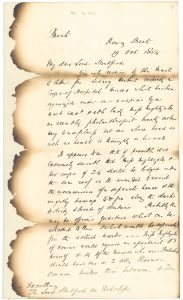
May 12, 2020, by H Cotterill
Florence and the 5th Duke
When Derbyshire’s own Florence Nightingale set out for the military hospitals of the Crimean War on 21st October 1854 she did so at the behest of another local figure, Henry Pelham Clinton, 5th Duke of Newcastle. As the owner of Clumber Park in Nottinghamshire the Duke was an important figure locally, but he also had a national role. A career politician he served as Secretary of State for War from the beginning of the Crimean conflict.
It was in this role that a friend of Nightingale’s, Richard Monckton Milnes, wrote to the Duke on the 14th October 1854. His letter, preserved amongst the Duke’s papers now held at Manuscripts and Special Collections, comments on the difficulties concerning the care of the sick and wounded. Monckton Milnes urges the Duke to contact Nightingale. ‘Did you ever hear of a Miss Nightingale, a lady of fortune & of the rarest moral qualities, who has devoted herself to the work of a Sister of Charity… If you thought of organising any establishment of nurses to send she is the person to apply [to]’.
Monckton Milnes’ letter may have been part of a co-ordinated campaign by Nightingale. Certainly at the same time she herself was writing to Sidney Herbert, Secretary at War (a distinct Cabinet position from the Secretary for War and one that no longer exists) offering to lead a party of nurses to the Crimea.
The approaches to Newcastle and Herbert worked. On the 19th October the Duke wrote to the British Ambassador at Constantinople, Viscount Stratford de Redcliffe, informing him that Nightingale would be coming out at the head of a party of nurses, ‘… a Corps of Hospital nurses which has been organised under our auspices by a Most exc[ellen]t & able lady Miss Nightingale. No rambling philanthropist hunting out Her way to usefulness but one whose head as well as heart is thoroughly in her work…’
Nightingale went on to win great acclaim for her work during the Crimean War. For the Duke of Newcastle it was a very different story. As Secretary of State for War he had inherited a military organisation that was hopelessly outdated and disorganised. This was compounded by mistakes made by the military authorities on the ground in the Crimea. The British Army came to near disaster in the winter of 1854-55. Whilst by no means the only person at fault Newcastle became the focus of press and public anger at what they saw as the mismanagement of the war and lack of care for the soldiers, and he was forced to resign in disgrace on 1 February 1855.
Manuscripts and Special Collections holds the Duke’s official correspondence from the period he was in office as Secretary of State for War as well as his personal correspondence. We also have a journal kept by the Duke whilst he undertook a tour of the East. After resigning his post the Duke was invited by the Prime Minister to travel to the Crimea and Constantinople to report on the state of the army and the hospitals. This allowed the Duke to see for himself the realities of a situation that he previously had been reliant on correspondence, despatches and reports for. Many of the Duke’s papers relating to the Crimean War have been damaged by fire, possibly in a fire which occurred at Clumber Park in 1879. We’re very fortunate that so much survives to enable research into Newcastle’s work during this important period and his relationship with Florence Nightingale.
Manuscripts and Special Collections is celebrating International Nurses Day on 12 May with the launch of an online exhibition marking 200 years since the birth of the world’s most famous nurse, Florence Nightingale. nottingham.ac.uk/manuscriptsandspecialcollections/exhibitions/online/florence-nightingale/index.aspx
No comments yet, fill out a comment to be the first


Leave a Reply